Composting: Meaning and Benefits of Composting
Composting is a natural biological process carried out by various microorganisms e.g. bacteria and fungi that utilize solid waste as an energy source and break down organic material into simpler substances.
Recycling of various organic materials such as food or plant materials otherwise regarded as waste products produces a soil conditioner called humus. The process of breaking down the waste materials is referred to as composting and it is carried out by bacteria, fungi, worms and other organisms under aerobic conditions.
It can also be defined as the decomposition of organic waste such as food or plant materials by bacteria, fungi, worms and other organisms under aerobic conditions. The process recycles various organic materials otherwise regarded as waste products and produces a soil conditioner called humus.
Read Also: Principles of Plant Analysis Data Interpretation
Benefits of Composting

1. Compost increases the soil nutrient level.
2. Product (compost) serve as soil amendment improving the soils structure and aeration.
3. It increases infiltration thus reducing surface runoff.
4. Waste management: means of reducing the amount of waste e.g. yard waste, food scrapes, leaves, crop residues, sewage sludge etc. that would otherwise be disposed in landfills.
5. The compost can be used as mulching material.
6. Potting mix: blended with potting soil for container plants.
Read Also: Problems Associated with Plant Analysis
In conclusion, composting (biological process of decomposition of organic waste by various microorganisms) is a beneficial practice which serves as soil amendment improving the soils structure, texture, soil water conservation and aeration.
Composting is a natural biological process carried out by various microorganisms e.g. bacteria and fungi that utilize solid waste as an energy source and break down organic material into simpler substances.
Composting has numerous benefits some of which include; increase in soil nutrient level, water infiltration, means of waste disposal, used as mulch materials and soil for potted plants.
Read Also: The Impact of Water Conservation on the Environment









